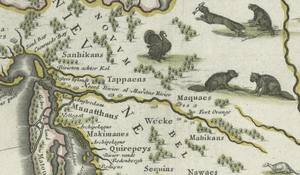Tappan tribe facts for kids

Map c. 1635, Tappans lived primarily on the west side of the Hudson River in what has become Bergen County, New Jersey and Rockland County, New York
|
|
| Regions with significant populations | |
|---|---|
| formerly New Jersey and New York | |
| Related ethnic groups | |
| other Lenape people |
The Tappan were a group of Lenape people. They lived in the areas around the Hudson Palisades and the New York – New Jersey Highlands. This was during the 1600s, when Europeans first came to settle the land.
What Does "Tappan" Mean?
The name Tappan was likely given to them by the Dutch settlers. It probably came from a word in the Algonquian language Lenape. The Dutch spelled it as Tappaen. We are not sure what the Tappan people called themselves.
There are different ideas about what the word Tappan means. One idea is that it comes from tuphanne, which means cold water.
Today, the Tappan people are remembered in many place names:
- Lake Tappan is a reservoir on the Hackensack River.
- The Tappan Zee is a wide part of the Hudson River. The bridge crossing it was also named after them.
- Old Tappan is a town in Bergen County.
- Tappan is a town in Rockland County.
The Tappan People's History
The Tappan people moved with the seasons. They grew crops together, hunted animals, fished, and trapped. Other native groups lived nearby and shared land with them. These included the Hackensack, Acquackanonk, and Rumachenanck (later called the Haverstraw).
The Tappan belonged to the Turtle Clan. They spoke the Unami dialect of the Lenape language. The Tappan and Hackensack people were actually very close. They were sometimes seen as one tribe. People called them by either name depending on where they lived.

These groups, along with the Raritan, Wappinger, and Manhattan (also known as "Manhattoe"), were called the River Indians. Groups living in the nearby highlands to the west and north are known as the Munsee.
When European settlers arrived, the Tappan first traded with them. David de Vries bought land from the Tappan in 1640. He built a homestead called Vriessendael in what is now Edgewater. De Vries lived among the Tappan and wanted to learn more about their culture.
Later, a leader of New Netherland named William Kieft tried to make the Tappan pay taxes. The Tappan ignored him. In 1643, some Tappan people sought safety at Pavonia. Kieft allowed many of them to be attacked there. This event started a conflict known as Kieft's War.
 | Jessica Watkins |
 | Robert Henry Lawrence Jr. |
 | Mae Jemison |
 | Sian Proctor |
 | Guion Bluford |

